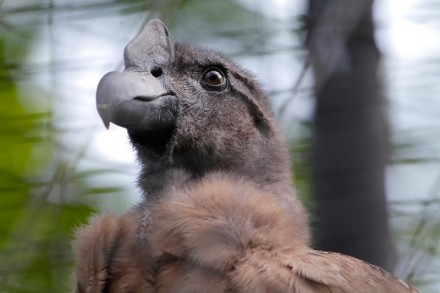
Ya gotta go to the zoo this weekend:
Connecticut’s Beardsley Zoo is excited to welcome new animals to the Zoo just in time for its 90th birthday, most notably an Andean condor. Desmond, a one-year-old male, arrived recently from the Denver Zoo in Denver, Colorado. The young condor is located in its exhibit near the Zoo’s front gate. Also new on exhibit are a Yacare caiman, a Canada lynx, and nine vampire bats.
“The condor is an enormous bird and is the first exhibit visitors see when they enter our gates, acting as an ambassador for us,” explained Gregg Dancho, director, Connecticut’s Beardsley Zoo. “As we celebrate our 90th year of operation, being able to have our guests experience such magnificent creatures is what Connecticut’s Beardsley Zoo is all about.”
Condors are the largest flying land birds in the western hemisphere with an average wingspan of about 10.5 feet. Andean condors are found in the Andes mountains and adjacent Pacific coast of western South America. It is a large black vulture with white feathers surrounding the base of the neck and large white patches on its wings. The head and neck are nearly featherless and are a dull red color, which may change color in response to the bird’s emotional state. Unlike most birds of prey, the male is larger than the female. Condors prefer to munch on large carcasses, such as those of deer or cattle.
In December, the Zoo announced the arrival of two female Canada lynx. One female has since been transferred to make room for a male to arrive in its place. The male, age one, arrived in early April from the Assiniboine Park Zoo in Canada and is now exhibited with the female in the lynx exhibit next to the tigers. The Zoo plans to try to mate the two lynx in hopes to have kittens sometime next year.
This spring the Zoo added nine vampire bats to its already existing colony to make a grand total of 18 male bats. Common vampire bats are small, furry grayish-brown bats with lighter brownish bellies. Ranging from just 2.75 to 3.5 inches in length, they have a wingspan of up to 15.75 inches and weigh just 1.2 ounces. The bats have large eyes, a rounded nose, pointy ears, and very sharp teeth. They enjoy warm climates, such as deserts and rainforests. Common vampire bats are the only mammals in the world known to feed exclusively on the blood of their prey. Normally that prey includes sleeping warm-blooded creatures such as pigs, cattle, chickens or even humans. Contrary to popular belief, these animals do not suck blood but make a small incision with their razor-sharp teeth and lap up the flowing blood. They have a chemical in their saliva that is 20 times more powerful than the most effective anti-clotting medicines!
Yacare caiman Baby Animal Updates:
A baby Yacare caiman hatched at the Zoo in October has recently made its debut in the Rainforest building. Although they superficially resemble American alligators, Yacare caimans are brownish, medium-sized caiman up to 10 feet in length with a more triangular snout and toothier profile than their American cousins. While all crocodilians (alligators, crocodiles, caiman, and gharials) eat fish, many species focus on certain prey species–for Yacare caimans that species is snails.
The Zoo also has bid farewell to some furry friends including its male Andean bear, a young pronghorn born last July, a female lynx and two anacondas. The bear was transferred to The Good Zoo in Wheeling, WV; the pronghorn is now at the Metro Richmond Zoo in Richmond, VA; the anacondas may be found at Omaha Henry Doorly Zoo in Omaha, Nebraska; and the lynx calls the Franklin Park Zoo in Boston, MA home.
The transfer of these animals is coordinated through the Association of Zoos & Aquariums (AZA) Species Survival Plan Program. Animals are regularly transferred between AZA accredited zoos in order to help manage specific, and typically threatened or endangered, species populations.
Connecticut’s Beardsley Zoo is open daily from 9:00 am to 4:00 pm. Adult admission (ages 12 & older) is $12.00, children (ages 3 -11) and senior admission (62 and older) is just $10.00, and children under 3 years old are free. Zoo members are also admitted free. Parking at the Zoo is free of charge. For information, call: (203) 394-6565. Connecticut’s Beardsley Zoo is located at 1875 Noble Avenue, Bridgeport, Connecticut.


Why is Anna’s picture at the head of this article?
*** JUST WHAT WE NEED, MORE BLOODSUCKERS! ***